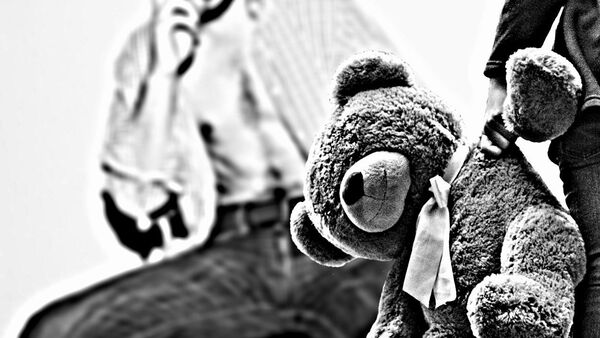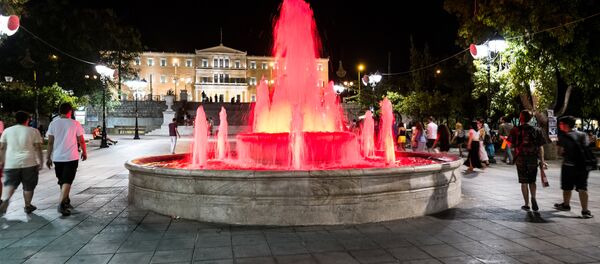The report, authored by Dr. Vasileia Digidiki and Professor Jacqueline Bhabha at the University's Center for Health and Human Rights, finds a "shocking, pervasive and growing epidemic" of sexual exploitation and abuse of child refugees who have fled major conflict zones such as Afghanistan, Iraq and Syria. In short, victims of Western imperialism are selling their bodies to meet the exorbitant fees charged by people smugglers for extraction, which can total thousands of euros.
New FXB report on the exploitation of migrant children in Greecehttps://t.co/StdxZs43iP pic.twitter.com/n1uTl2RsBu
— HarvardFXB (@HarvardFxb) April 17, 2017
The authors demand an end to the detention of child migrants, more specialized shelters for children who have suffered from abuse, an improved legal guardianship system, better data collection relating to child refugees, independent translators and separate areas in the refugee camps for children and families.
"This emergency can no longer be ignored. We can no longer sit idle while migrant children are abused and forced to sell their bodies in broad daylight and plain sight in the heart of Athens simply to survive. It's our responsibility as human beings to face this emergency head on and take immediate action at every level to put an end to this most heinous violation of dignity and human rights," said Dr. Digidiki.
The average price of a sexual transaction with a child is €15 (US$16), and the largest group selling sex are Afghani boys, followed by Syrians, Iraqis and Iranians. Customers are typically males aged 35 and above, both in urban and rural areas.
The problem is exacerbated, the report said, by "a dramatic failure of protection" on the part of governments in Europe.
For instance, Greek child protection agencies received referrals for 5,174 unaccompanied migrant children in 2016, the group at the highest risk of sexual exploitation — but as of December 31, only 191 had been transferred to other European countries, and 50 percent of those remaining still await relocation to specialized, child-friendly accommodation. The authors suggest the numbers "underscore the reluctance" of many European countries to provide refugee children with a safe and permanent home.
Ad for Safe Home Campaign for unaccompanied minors
— Derek Gatopoulos (@dgatopoulos) April 4, 2017
HT @bodossaki#Greece #Refugees pic.twitter.com/wZ5yE9jabJ
The report does acknowledge Greek authorities have made some appropriate provisions for vulnerable children, in the form of specialized camps and centers, but also notes not all have access to these provisions.
Moreover, the camps are not entirely safe environments for children — instances of rape and other forms of sexual assault have been reported. Organized criminal gangs are also said to have kidnapped children, for the purposes of child marriage, labor and blackmail. In the latter instance, humiliating photos are taken of abused children, with the threat the pictures will be dispatched to the children's families back home unless they pay.
In the UK, efforts to offer sanctuary to child refugees have been at best tepid, at worst outright regressive — Section 67 of the Immigration Act (known as the Dubs Amendment), which allows for the transfer of a certain number of vulnerable unaccompanied children to the UK, was controversially ditched in March. Lord Dubs, the amendment's originator, said the move amounted to the UK "shutting the door on the world's most vulnerable."
Refugees are made in the image of God. I'm shocked and saddened by the Government's decision on the Dubs Amendment. My full statement: pic.twitter.com/UonIZJS8bE
— Justin Welby ن (@JustinWelby) February 9, 2017
Moreover, the government has also declined to comment on the number of children transferred under Dublin III regulations, which give families the legal right to reunion, in 2017. A mere five refugee children are believed to have been transferred to the UK under the scheme in 2016.
The Irish government also operates a program to resettle unaccompanied minors from conflict zones and areas of danger, although in its year of operation it has only homed 27 children — 21 from Calais, and six from Greece.
The report's conclusions are not entirely new — stories of child drug addiction and prostitution in refugee camps hit headlines in December 2016, and European Parliament groupings have called for a renewed approach to refugees, to evidently no avail — not enough is being done by national, regional and international bodies to address the emergency.
"A very important moment for the support of the unaccompanied minors who are trapped in Greece" @metadrasi https://t.co/5ogU0GY7jc
— NoMoreWalking (@NoMoreWalking) April 7, 2017
However, the scale of the issue was perhaps less well understood at that point, and Professor Babha is hopeful the findings will spur action, in the least a fundamental rethink among governments and intranational bodies on how to adequately allocate human and financial resources to alleviate the suffering. She says that while her colleagues had had an inkling child refugees were vulnerable to exploitation, they were nonetheless extremely distressed that prostitution had become so endemic.
"Children are using what one might dreadfully call 'survival sex' just to manage their daily lives, and to deal with the dead-end situation they find themselves trapped in. One particularly distressing thing is these children — some of whom are as young as 11 — are often carrying an enormous burden. They're the only family member who has managed to flee, leaving behind a widowed mother and younger children, who depend on that child for their survival or well-being. There is inadequate understanding of the extent of human misery, suffering and devastation in the regions people are fleeing from. We have failed children," Professor Babha told Sputnik.
Professor Babha adds that while Greece's response has been less than perfect, the country still made commendable efforts to deal with the problem, particularly in light of the crisis erupting just as the country was emerging from the depths of a savage economic collapse. If blame for the catastrophe must be apportioned, she says, it must be to the EU and other supranational and intergovernmental bodies.
"Another aspect that worries us is the endemic violence in the shelters in which the children are staying. It takes two forms — a lack of adequate security, as camp guards leave at seven pm, and there are no adequate locks or other mechanisms to keep women and children safe. Because circumstances are so harsh, parents themselves are taking out their inability to cope on their kids. One woman we documented received a negative response to her asylum claim, and lashed out at her kids — it's a symptom of the despair they feel at the lack of alternatives. Children bear a huge amount of the brunt of the suffering."



